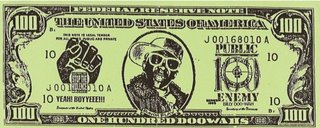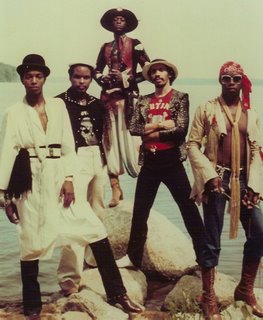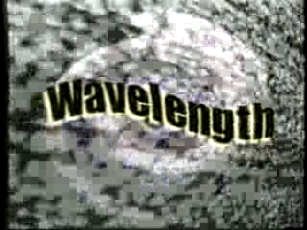Wednesday, September 27, 2006
Love and Hell
My second interview almost didn't happen. Arrangements with the record label (Elektra) fell through. The more I got involved in the video game, the less this would happen, but it wasn’t uncommon. Luckily, I was armed with a copy of music video trade magazine that I wrote for and I was able to convince them of my legitimacy when I told them about my video show, which hadn’t really started yet.
I think I ticked group memeber Charlie Brown off as I went about setting up the interview, I went to Busta first. Apparently, Mr. Brown was the leader of the leaders. Sorry, Charlie.
No group out today touches what the Leaders of the New School were about: teamwork. They performed as unit, setting off verbal exchanges between themselves and punctuating their punchlines with gestures and movement. Compare them to today’s rap lords, pacing the stage like caged beasts, stepping on each other’s lyrics and sneakers. Nobody rocked it like LONS did, and nobody has since.
The group disbanded after their second album in 1994. Busta Rhymes ran with respect he gathered as the centerpiece of the group and began a successful solo career. Brown has made occasional guest appearances on other rapper’s songs. Dinco D posted a dis record aimed at Busta on his myspace site recently. If anyone knows what became of the group's DJ, hit me up.
CRAIG: Yo, what's up I'm here with Leaders of the New School.
BUSTA RHYMES: What's goin' on, What's goin' on?
CHARLIE BROWN: Charlie Brown in the house.
BUSTA: Busta Rhymes, lyrical monster!
DINCO D: Dinco D!
BUSTA: You know what I'm sayin'? Yes, Yes, Yes!
CRAIG: You guys have an old school flavor. What were some of your influences?
BUSTA: I mean, definitely influences and examples have to be set, you know. You got a start from a foundation.
CHARLIE BROWN: Cold Crush Brothers, Flash is in there, Afrika Bambaataa –
DINCO D: Chuck D.
CHARLIE BROWN: Chuck D, Run-DMC. There's a lot of people that influenced us. As far as that old school sound, it's only because we work as a unit and as a team, together an that's what the old school was about. Not just one person coming out there by themselves.
CRAIG: Speakin' of teams, a lot of new rappers have come out this year, but one of them has already self-destructed, Brand Nubian. What's going to keep the Leaders of the New School from doin' the same thing?
BUSTA: Well we can't speak on the situation with the Brand Nubians, 'cause we don't know nothin' about it. I mean, sometimes things happen, you got to go through love and hell to come out right. Whatever happened, happened. I just want all of those brothers to still prosper do and do what they got to do.
CRAIG: Have you been approached by any R&B artists to perform on their records?
BUSTA: No.
CRAIG: If you were, would you do it?
BUSTA: We don't know, it depends.
CRAIG: What was it like working with A Tribe Called Quest?
DINCO D: It was cool working with them. They got the same vibe we have. We met up through the business, in New York.
BUSTA: It was lovely.
CRAIG: What do you think about the editor of Billboard asking retailers not to sell Ice Cube's new tape?
BUSTA: I don't agree with it, I don't appreciate it. Because, a man should always have the opportunity to express what they feel. You know what I'm sayin'? If you feel somethin', you should have the opportunity to express it–
CHARLIE BROWN: They tryin' to limit it!
BUSTA: What you feel is for real, you know what I'm sayin'? Bein' that what you feel is for real, and you're real, and you exist in reality, you should have the opportunity to express what you feel.
Thursday, September 21, 2006
Friend of the Enemy

You’ve got to understand, there wasn’t a bigger Public Enemy fan than me. I memorized the music on their first two albums. Not just the lyrics, but the beats, the samples and sound effects. I had the UPC code from their first two records written on the tounge of my sneakers. If you didn’t like Public Enemy, well, let’s just say that deep down, I believed that something was wrong with you.
So imagine my reaction when my director, A.J. called and asked me if I would like to interview Public Enemy. Once I floated down to earth, I got in the Camaro and headed to the Richmond Coliseum. I had to share the interview with another host of a different show, (I think her name was Monica.) but I didn’t care. This was something I hadn’t dared to dream.
I think the interview went on for about 30 minutes. I was new at the job, and didn’t know how to wrap things up smoothly, so I just kept going. Chuck left after about 10 minutes and Monica and I kept talking to Flav until he had to go. It was surreal.
Chuck was gracious and attentive and Flav was .... Flav. I got Chuck to speak on the group’s eventual irrelevance and his least favorite music video (Shut ‘em Down). Flav gave us a hundred doowahs as he departed. It was a good night.
It was unusual place to start my career as a tv show host, interviewing one of the top bands of the time as they headlined a big tour. Could anything eclipse this? I needed to know, so I just kept going.
Saturday, September 09, 2006
Fun with A Big Foot

I was really prepared for my first show. I wrote out all the questions, follow-ups and a couple of adlibs. I attempted to script everything. I wanted it to be the perfect show. My quest for perfection was cut short when the producer ran the wrong intro at the top of the show. Damn.
The sole guest on my first show was Parliament-Funkadelic expatriate Jerome “Bigfoot” Brailey. My P-Funk obsession was in its early stages back then. I had just discovered their greatest hits and was starting to dig deeper into their catalog, when I heard that a guy from my hometown had played in the band. I wondered what had become of him.
As luck would have it, the next week, I was standing by my security desk at Burlington Coat Factory. A girl I worked with at danced by my desk and said she was going to a party at Jerome's. I didn't make the party, but she hooked me up with Jerome later.
The show is hard for me to watch now, with the weight of all the years and styles that have passed since '91. But it is a factual, informative document that I was glad to be a part of and Jerome's story is one that deserves to be told.
Jerome’s involvement with the show didn’t end there. I used a track from his 1996 album Aftershock 2005, “The Growl,” as the Wavelength theme song for several years. He appeared on the show a second time and we've maintained a good friendship.
Tuesday, September 05, 2006
The W File

This blog is an attempt to document and reconcile a part of my past. It is hoped that by retelling my triumphs, failures and bittersweet memories, some healing will occur. This exercise is sponsored by the Dee Barnes Center for Recovering Video Show Hosts, and my participation is compulsory, so this story will be told. But I’ll be telling it my way.
My involvement in the music industry started in 1990. I opened the case of my Young Black Teenagers cassette and found the phone number to SOUL Records. I stared at the number in disbelief. Could it be the def,dope and dangerous world of rap music was this close to a suburban kid who lived on a street named after a field of corn? I called the number and someone said “Soul Records.” I hung up. Damn, I thought, it really was the record label.
I gathered my nerve and called back later and spoke to a man named Simon Ajose. I told him that I needed some music videos for a show I helped produced for public access television in Richmond, Va. I suspected there might be a process or form to fill out, but all he asked for was my address. In few days, the clips for “Loud and Hard to Hit,” (Young Black Teenagers) “Change The Style” and “The Band Gets Swivey On The Wheels” (Son of Bazerk) were in my mailbox.
Despite my efforts to infiltrate the rap business, the television show I worked on fell apart. There was an empty time slot where our show had been and I was a young producer eager to make my mark. I joined forces with another guy at the studio and we decided to do a few shows, just to prove we could do it. I called mine Wavelength.
It was only supposed to be a few episodes, but I quickly discovered something about doing the show. I liked it and I never wanted it to stop.
So, thus begins my mandatory journey into the past. There's no telling what I might dig up.
Subscribe to:
Posts (Atom)
